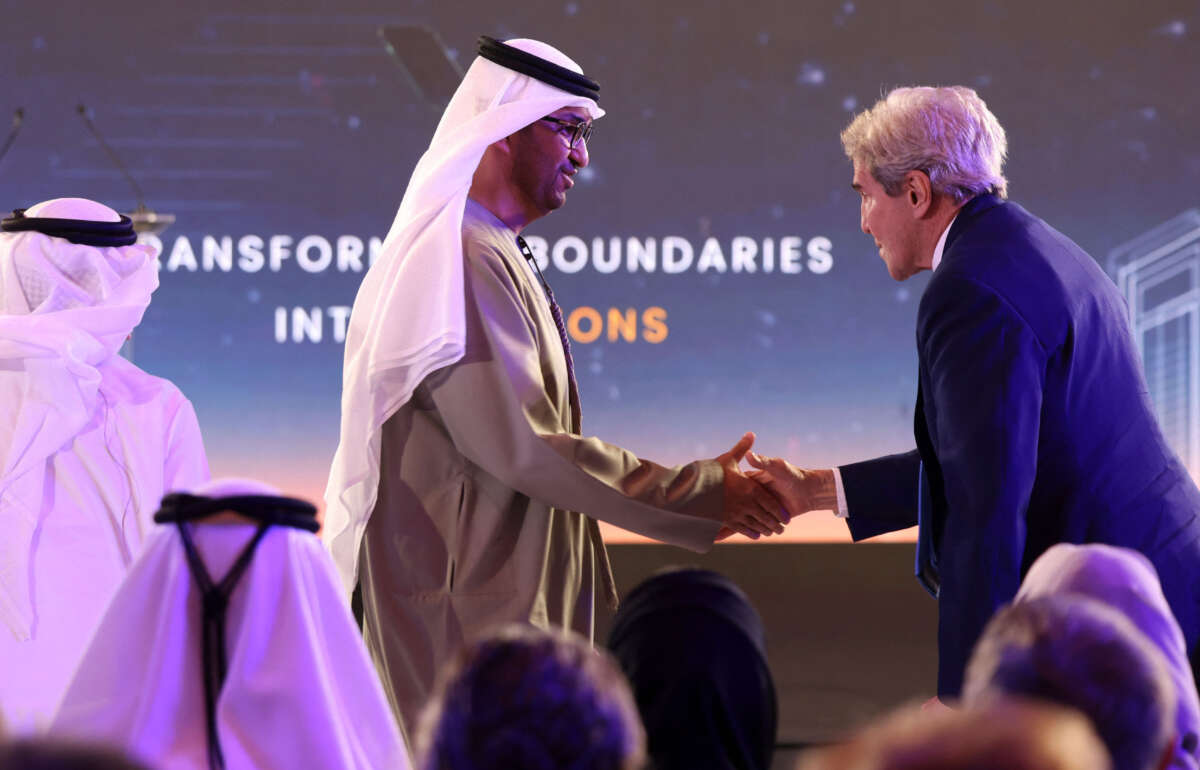Progressives on Monday reacted with outrage and disbelief after U.S. climate envoy John Kerry backed the appointment of Sultan al-Jaber to lead the United Nations’ annual conference on the climate emergency, saying the CEO of the United Arab Emirates’ state-run oil company was not only qualified to preside over the summit, but that his background strengthened the case for his presidency.
As Common Dreams reported last week, the UAE named al-Jaber as president of the 28th United Nations Framework Convention on Climate Change (COP28), scheduled to begin in November — a decision that was met with scorn from campaigners as al-Jaber is heads the Abu Dhabi National Oil Company (ADNOC) and a renewable energy firm in which ADNOC holds a 24% stake.
“I think that Dr. Sultan al-Jaber is a terrific choice because he is the head of the company. That company knows it needs to transition,” Kerry told the Associated Press Sunday, despite the fact that scientists and advocates across the globe have also known for decades that policymakers must lead a rapid transition away from oil and gas-generated energy. “He knows — and the leadership of the UAE is committed to transitioning.”
Advocates have warned that the UAE has not made clear how it plans to reach its stated goal of being carbon neutral by 2050, especially as it plans to increase production of crude oil by a million barrels per day.
The UAE is expected to become “the third largest expander of oil and gas production” between 2023 and 2025 as ADNOC embarks on the second-largest expansion of oil production of any company in the world, locking in more than 2.7 gigatonnes of CO2 emissions.
But when asked by Sky News Arabia about whether al-Jaber would have a conflict of interest at the conference, where leaders are expected to be pushed to take significant emissions-reduction steps, Kerry dismissed the concern.
“That’s a first blush, very simplistic way to look at this,” Kerry said, adding that “the only way we will meet this crisis and protect our citizens and build an economy for the future, is by reducing emissions.”
Putting the ADNOC executive — who is also the UAE’s climate enjoy and minister of industry and technology — in charge of COP28 drew comparisons from Progressive International leader Yanis Varoufaki to naming “a jihadist to oversee religious tolerance” or “a Nazi to oversee racial harmony.”
“What could go wrong?” labor historian Erik Loomis asked sardonically.
COP28 will follow the two most recent international climate conferences, held in Glasgow, Scotland and Sharm el-Sheikh, Egypt, where hundreds of fossil fuel lobbyists were in attendance and policymakers failed to hammer out a final agreement requiring countries to phase out oil, coal, and gas extraction.
Kerry told Sky News Arabia that the UAE was not “involved in changing” the outcome of the COP26 and COP27 talks.
The former secretary of state acknowledged that there would be “a level of scrutiny” aimed at al-Jaber’s appointment.
“And I think that’s going to be very constructive,” he told the AP. “It’s going to help people, you know, stay on the line here. I think this is a time, a new time of accountability.”
Acknowledging Kerry’s negotiating of the Paris climate agreement in 2015 — which despite its many flaws and shortcomings represents the strongest global pact ever reached on the issue — Leo Roberts of the climate think tank E3G said on social media that the U.S. politician’s endorsement of el-Jaber represents “a really rather spectacular fall from grace.”
Join us in defending the truth before it’s too late
The future of independent journalism is uncertain, and the consequences of losing it are too grave to ignore. To ensure Truthout remains safe, strong, and free, we need to raise $46,000 in the next 7 days. Every dollar raised goes directly toward the costs of producing news you can trust.
Please give what you can — because by supporting us with a tax-deductible donation, you’re not just preserving a source of news, you’re helping to safeguard what’s left of our democracy.
